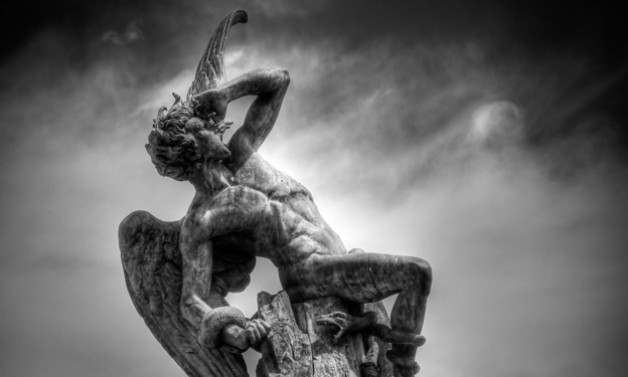With the fear of Ebola’s hemorrhagic fevers, the dread of post-Soviet invasions, the horror of Islamic State beheadings, the scourge of marital abuse and collegiate rapes, the world has a lot of people scratching their heads. What got us into this mess?
Our secular storytellers provide us an etiology: we are animals with a savage, evolutionary prehistory, inclined to engage in direct intraspecific competition for limited resources, exhibiting forms of physical and sexual aggression which increase reproductive success.
I suppose that’s part of it, but it sure seems a bit superficial.
The soul that suffers with the suffering seeks a greater narrative arc than the secular story provides, for what is being called into question by such suffering is the goodness of existence itself. Here I doubt if even an atheist evolutionary psychologist can withhold judgment—need you believe in God to “return your ticket” with Ivan Karamazov?
The question confronts each of us: Is existence good? Why does anything exist at all? Whence the suffering? Whence its end? And such an existential story as this could be told by only one—the Author of it all. Only the one to whom time belongs can truly say “in the beginning“ and “in the end.”
Thanks be to Him, this Author has spoken. He reassures us that in the beginning everything was good, indeed very good. Man and woman were placed at the pinnacle of his visible creation, initially endowed with preternatural gifts of immortality and self-mastery. Above us embodied spirits, he created the angels, pure spirits who like us image the Author in his knowing and loving.
The Author goes on to tell us how sin and death entered the world by “the ancient serpent, who is called the devil and Satan, who deceived the whole world” (Rev 12:9), the drama of whose downfall is captured so poetically by Milton:
Who first seduc’d them to that foul revolt?
Th’ infernal Serpent; he it was, whose guile
Stird up with Envy and Revenge, deceiv’d
The Mother of Mankind, what time his Pride
Had cast him out from Heav’n, with all his Host
Of Rebel Angels, by whose aid aspiring
To set himself in Glory above his Peers,
He trusted to have equal’d the most High
Satan’s specter, the shadow of his primordial pride, hangs over all our ills. Before anyone faced the fear of death or the choice to debase or ennoble, to heal or destroy, there stood an angel, Lucifer, unparalleled in angelic splendor, who received a divine invitation and the choice to either accept or reject it. The nature of that gift and the possibility of its rejection illuminate the drama at the heart of the cosmos.
The gift was nothing less than an invitation to enter into the beatific communion of God’s own inner life, a gift offered to Lucifer along with all of the angels and later all mankind. The angels already enjoyed the finite happiness proper to their nature, for they were created without defect, but God offered them something infinitely beyond their natural power, a share in his own infinite beatitude. Even for the angels, this gift could not be fully understood; it could only be received in a trusting act of faith, one graced act of charity, abandoning oneself to the love of God.
Lucifer refused the gift: he grasped at the dignity of being the source of his own happiness, a dignity that belongs only to God. As St. Thomas puts it, “He desired resemblance with God in this respect . . . He sought to have final beatitude of his own power, whereas this is proper to God alone.”
St. Anselm observes that there is a terrible irony in Lucifer’s fall: “He sought that to which he would have come had he stood fast.” If only he had trusted God, Lucifer would have received the divine life he grasped. Instead, in rejecting submission to God’s love, he turned away from the source of all happiness, and “hurld headlong flaming from th’ Ethereal Skie” he and his angel followers fell from grace.
Lucifer, now Satan, then whispers his familiar lie in our parents’ ear, “The moment you eat of it . . . you will be like gods,” and the terrible irony is again repeated: they, too, sought that to which they would have come had they but stood fast.
Of course, this is only the beginning of the story. The hope of that first promise—the promise rejected by Lucifer, Adam, and Eve—has indeed been renewed. God became man. Where Adam disobeyed, Jesus the Christ, the Son of God, was obedient, was crucified, died, and was buried, rising on the third day, breaking the bonds of sin and death.
This was once the story that defined Western Civilization. Many men have died in its telling, and in the end, they too shall rise.
The Womans seed, obscurely then foretold,
Now amplier known thy Saviour and thy Lord,
Last in the Clouds from Heav’n to be reveald
In glory of the Father, to dissolve
Satan with his perverted World, then raise
From the conflagrant mass, purg’d and refin’d,
New Heav’ns, new Earth, Ages of endless date
Founded in righteousness and peace and love
To bring forth fruits Joy and eternal Bliss.
✠
Image: Ricardo Bellver, Fuente del Ángel Caído







